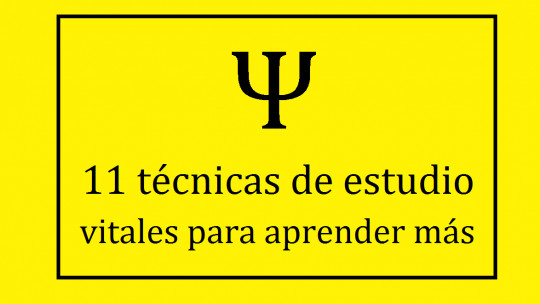
For some people, getting ready to study for an exam can be a real challenge, especially if they tend to get distracted during study times.
In this article We will review different tips to avoid being distracted by studying which will significantly help you enhance your concentration when focusing on the topics you need to learn in order to master the subject and pass the evaluations in the best possible way.
9 tips to avoid getting distracted by studying
Much of academic performance depends on our ability to concentrate on what we must study. As the days and weeks pass, The difference between avoiding distractions or not doing so is decisive if we want to learn well
In the following list we are going to see several tips and recommendations to avoid being distracted by studying; Applying them during study days will guarantee getting the best out of them.
1. Find an appropriate environment
The first thing we must do is select a suitable place to study. Several factors will have to be taken into account that influence the selection of the work environment. Ideally, it should be a quiet place, away from any type of annoying sounds (sonic pollution) among other distractors.
It is also recommended that the study place is not a place that we associate with rest (for example, our room).
2. Gather the materials in advance
It’s not enough to find a quiet place; It should also be a place where we have at hand the necessary resources for study; It is of no use to study in a quiet place if we do not have the required material and that forces us to get up and go look for things many times, which exposes us to distractions.
An effective way to simplify the study process is Properly arrange all the materials you will need before starting to study so that the study is as uninterrupted as possible.
If you have the information on an external storage device or email, it is recommended that you download it to your computer and have it at hand on your desktop, for greater convenience.
3. Find study partners
Finding good study partners is an important motivational factor because we can learn better when we interact with people who have similar objectives and level of knowledge to ours.
Making study groups helps to cover more content related to the themes of the evaluations; Each one could dedicate themselves to studying a topic in depth, and then, in the collective discussions of the study days, explain it to the rest of their classmates and resolve doubts.
4. Carry food on hand
Having snacks available for studying is a good way to enhance our way of making the most of our time. We can reward ourselves with a small snack when we finish studying a topic for an hour, for example, and then take a break.
Besides, studying when hungry is very difficult and depending on where we are, looking for a bar or restaurant could take us too long.
5. Take breaks
Breaks are important to be able to consolidate in the best way the knowledge that we are memorizing If we study continuously and do not allow our brain to adequately process new content, it will be more difficult for us to remember that content in the future.
The ideal is to take scheduled breaks You can set an alarm to make sure you don’t miss the moment to interrupt the study dynamic. On the other hand, it is a good idea to have the exact time of each break defined. This is one of the easiest tips to avoid getting distracted from studying, because you just have to program alerts on your watch or smartphone and obey them when they sound.
6. Find motivation
Arranging to study against our own will is not something that greatly favors our concentration, the ideal is to look for the reasons why it is convenient for us to study. Thus, we can achieve internal motivation that will help us enhance our concentration
A good way to get this type of motivation is set a goal that is achievable in the short term, so that we can go after it and feel that we are making positive progress towards its achievement. For example, review a chapter of the syllabus, finishing it in the next 4 hours.
7. Avoid postponing goals
Once you have everything you need to start studying, You may have intrusive thoughts that make you postpone studying, and instead of sitting down to read you start doing something else. This often happens when, for example, we believe that we will practically pass a subject and that is why we want to avoid thinking about it as much as possible, which means not deciding to study to prepare for the exam.
The ideal is to recognize these thoughts and combat them quickly. To do this, it is important that you follow short-term and very specific sequences of actions. For example: “when I finish eating I will go sit at my study table”, “when I am at my study table I must open my notebook”, etc. This way, you will always have a clear idea in mind of what you should do and when you should do it.
Don’t let procrastination take control of your actions when you have everything ready in front of you, immediately start the study activity you have planned and you will see how as you progress, the intrusive thoughts and the temptation to leave the task for later will dissipate.
8. Manage anxiety
In general, The feeling of anxiety is present when we feel that we have many pending issues and we have not advanced anything. Managing this anxiety is important, because if it is very intense it can paralyze us, trying not to expose ourselves to anything that reminds us of that obligation.
One way to avoid this characteristic feeling during exam times is to make a schedule with the topics to study, all in order of relevance. In this way, we can focus on these tasks sequentially, favoring an immediate perception of our progress, and we prevent anguish from taking over our mind. The more organized we are when planning our study day, the further away we will keep anxiety.
9. Regulate computer use
Currently our academic and work activities revolve a lot around our electronic devices (computers, smartphones, tablets, etc.), which undoubtedly represents a help when obtaining information. However, we must keep in mind that these devices can also play a distracting role for our mind.
The ideal is to use them to get the material we need and the specific knowledge that can help us study properly. If you see that you use them a lot to distract yourself, you can try to do without them while you study, or put clear limits on their use (for example, always having them disconnected from the Internet).
Therefore, we must adapt the study environment to what we know about what has the greatest capacity to distract us. If you have noticed that the presence of a digital device causes your attention to be divided when thinking about what you may be missing at that moment on social networks, for example, it is best to limit your access to this device or those Internet pages. during the study session.








